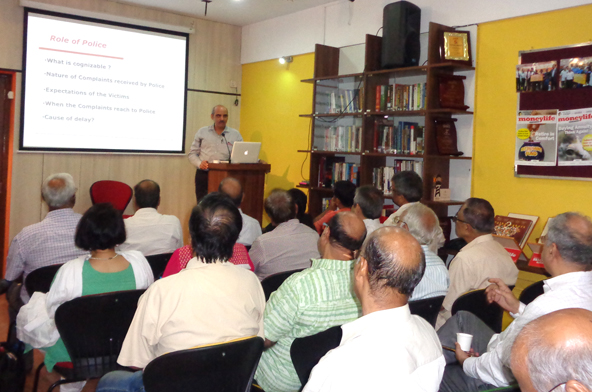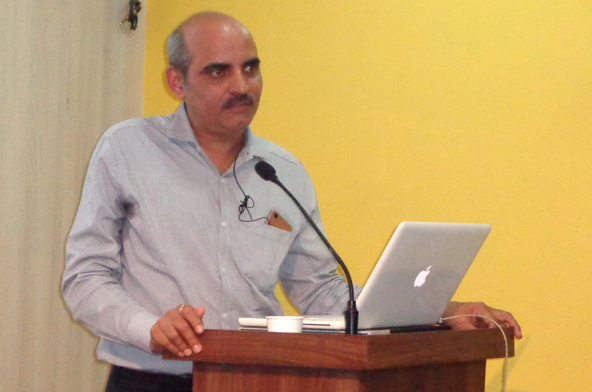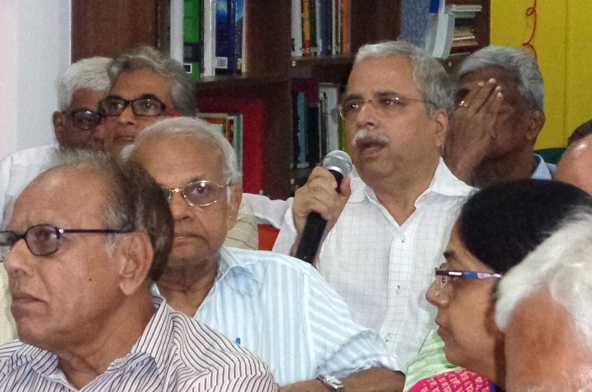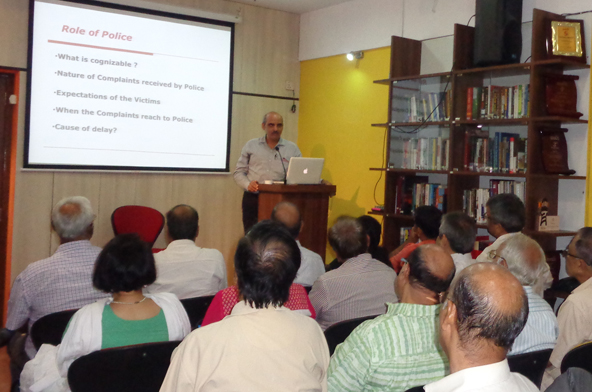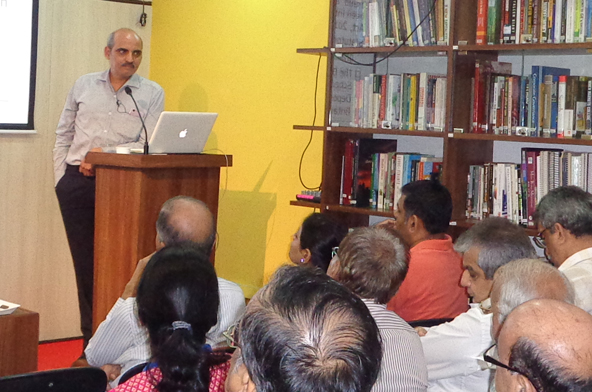
The intentions of the Maharashtra Protection of Interest of Depositors (MPID) Act, although good, requires some amendments like making Commissioner or Superintendent of Police as additional authority to authorise registration of first information report (FIR), and setting a specific time frame to appoint a competent authority in the case,” says Mahesh Aathavale, a former officer from Mumbai Police. He was speaking at a seminar-cum-guidance session on “Struggling to get back your corporate fixed deposit? Learn how you can approach the Police Economic Offences Wing (EOW)” organised by Moneylife Foundation in Mumbai.
Citing specific example of Birla Power Solutions Ltd, Mr Aathavale said, there are about 8,990 investors who had invested around Rs221 crore in the company’s fixed deposits (FDs). “Only one person is arrested in this case. So far, the authorities have secured movable and immovable assets worth Rs347 crore and also disbursed Rs61 crore to 8,029 investors. At present, the case is charge sheeted under Section 173(8) of the Criminal Procedure Code (Cr PC). Just last year, the government has appointed a competent authority in this case.”
The former police officer started his session by explaining role of police in investigation of financial probe, nature of complaints received by police and expectations of victims from police.
Touching upon the Prize Chits and Money Circulation Schemes (Banning) -PCMCS Act, 1978, the former police officer, who during his 24 year long career in Police had probed several fraud cases, gave information about money circulation and parameters of money circulation, and penalties for running such scheme.
“The PCMCS Act gives power to police to enter, search premises and persons and seize all things found in the said premises which are intended to be used, or reasonably suspected to have been used. Police can even forfeit newspapers and publication that contains any material connected with any prize chit or money circulation scheme,” Mr Aathavale said.
The former police officer, who had created and delivered training modules on various aspects of investigation of fraud cases to aspiring police investigators, banks and insurance employees, then explained the various provisions under Maharashtra Protection of Interest of Depositors (MPID) Act to protect and help get justice to investors.
He said, “The MPID Act, deals with a speedy remedy for recovery of payments in default and also provide remedy by criminal proceedings with stringent punishments and attachment of property. As per the Act, fraudulent default by a financial establishment attracts conviction for every person responsible for the management of the Establishment including the promoter, partner, director, manager or an employee.”
“The Government on a complaint or otherwise, can order the attachment of money or property of a financial establishment and appointment of a competent authority to control the same. In the absence or insufficiency of the money or property of the financial establishment the Government may attach the property or the promoter, partner, director or manager.
The Competent Authority has to file an application stating the grounds for attachment, the details of the investors, the value of the property etc. to the Designated Court constituted under the Act and the Court then would after issuing notice and hearing all the persons claiming an interest in the property confirm or set aside the attachment and in case of confirmation pass an order for disbursal of the amount to the depositor,” he added.
On 13 January 2010, the Maharashtra government issued a special notification and ordered setting up of special cells for investigation of economic offences in all districts of the State.
Mr Aathavale also informed the audience about procedure followed in cases registered under the MPID Act. “On receipt of information from the investor and with due approval from the superiors, verification or preliminary inquiry is initiated. If prima facie a commission of a cognizable offence is disclosed, then with intimation to the District Collector, an FIR under section 4(3) of the Act is registered in the concerned police station, against the concerned financial establishment and its office bearers.”
“After registration of an FIR, searches or seizures are carried out with respect to the movable and immovable properties of the accused institute or office bearers, partner, directors and anyone related to them. This property (ies) is / are secured to protect the interest of investors. Information regarding all such searches and seizures and secured properties details are forwarded to the District collector in the required format with a request to appoint competent authority. This information is also submitted to the Court as well as to the State Government.”
“The government also appoints a competent authority (not below the rank of a Deputy Collector) to take charge of all such movable and immovable properties. After taking stock and verifying all such properties, the Authority submits its report in the Special Designated Court under the MPID. The Court then issues notice to all the concerned parties whose properties are attached to show cause why the attachment should not be made absolute. If cause is shown or any objection is raised, then the Court follows the Procedure laid down in the CPC and examines the evidence adduced. The Competent Authority also notifies Government of Maharashtra, who then publish the same in the Gazette,” Mr Aathavale said.
The former police officer then shared information about some companies he probed. However, according to him, there are some challenges faced by officers while implementing the MPID Act. He said, “In most of the cases there is a delay in appointment of a Competent Authority by the Government of Maharashtra. As on date, 145 cases have been registered by EOW under the Act out of which in 40 cases appointment of Competent Authority is pending since 2000. This also leads to delay in disposing off the seized or attached property and returning such fund to the investor.”
“In MPID Act there is no specific clause granting power authorising police authority or investigation officer (IO) to seize or attach movable or immovable properties of the accused. Under the MPID Act, the Competent Authority has powers only to attach properties under his jurisdiction. This Act is silent on his powers to attach properties located in other states of India. In addition, there is only two designated MPID Courts situated in Mumbai Jurisdiction. Hence, there is delay in disposal of cases.
There is only one designated Special Public Prosecutor in MPID Courts in Mumbai who is already overburdened with many pending cases,” Mr Aathavale added.
Mr Aathavale then guided several investors who had invested money in company deposits and are neither receiving principal amount nor any interest.





